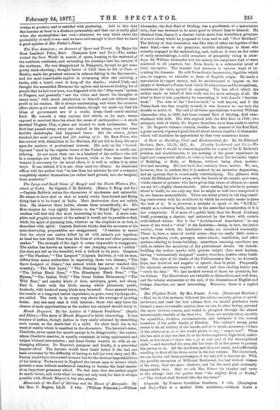Alexander, the first Earl of Stirling, was a gentleman of
a speculative turn, that was destined to do more good to others Menlo himself. He obtained from James I. a charter which made him hereditary governor of a new colony which he proposed to form and to call "New Scotland." The history of that foundation was like that of other enterprises of the same kind,—loss to the promoter, terrible sufferings to those who actually engaged in the undertaking, and, built as it were on the ruins of early undertakings, a solid structure of prosperity rising in after- days. Sit William Alexander lost his money, his emigrants died or were scattered to all quarters, but Nova Scotia is a substantial proof of their enterprise. The founder had recourse to various ways of re- cruiting his finances. Ho sold Nova-Scotia baronetcies, dignities whieh are, we suppose, as valuable as those of English origin. He made a speculation in copper money, and he endeavoured to impose on the people of Scotland a Psalm-book which Presbyterians and Episcopalians, unanimous for once, agreed in opposing. The last effort which the author made on behalf of this work was the most unhappy of all. He tried to float it into popularity by associating it with Laud's "Service- book." The fate of the "Service-book" is well known, and if the Psalm-book was less roughly treated, it was because no one took the trouble to notice it. The end of all these speculations was that William Alexander, who, in 1630, had been created Earl of Stirling, died over- whelmed with debt. His title expired with the fifth Earl in 1739; two attempts, both of which, Dr. Rogers describes, have been made to revive it. Dr. Rogers's volumes contain, besides the memoir of the first Earl, a great variety of genealogical details about various families of Alexander which will doubtless be appreciated by that very numerous house.


































 Previous page
Previous page